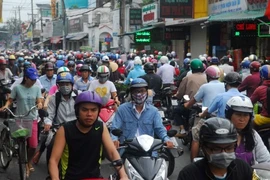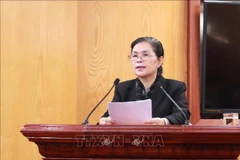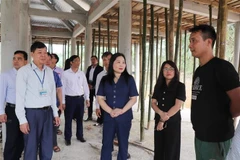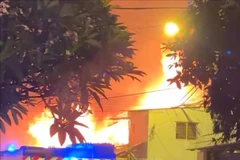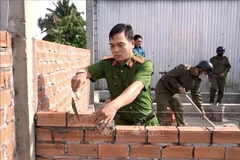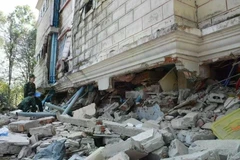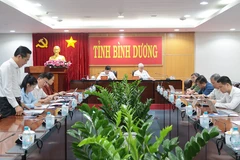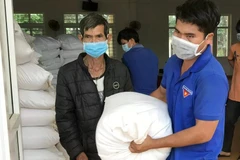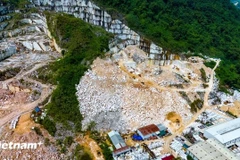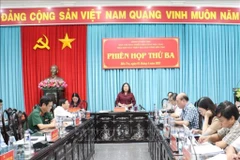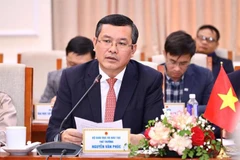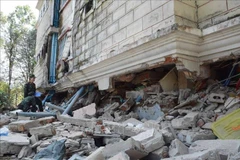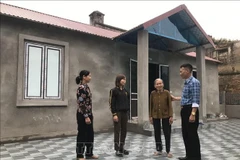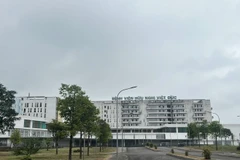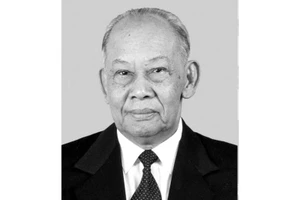HCM City (VNS/VNA) - Many infrastructure facilities, including roads are overloadedas many new residential areas have been built and the number of means oftransportation rapidly rise in suburban areas of Ho Chi Minh City in the pastfew years.
It takes longer time for residents from theseresidential areas to travel in these suburban districts.
Le Thanh Tu, a 34-year-old resident from HCMCity’s district 7, said it takes him from 45 to 60 minutes to travel the 6kmroad from his home to his office in district 5
Meanwhile, all members of his family have to“enjoy specialties such as traffic congestions” every morning and evening.
Tu said the two bridges of Nguyen Van Cu and KenhTe connecting his home to his office in district 5 are overloaded and he has todepart from his home at 6 a.m every morning because he would not like to betrapped in traffic jams on the roads for 30 minutes. “We were haunted withtravelling on these roads every day,” said Tu.
According to a report on Nguoi Lao Dong (Labourer)newspaper, on the morning of April 5, hundreds of cars and motorcyles werejammed on the Nguyen Huu Tho Street in district 7, struggling to reach Kenh Tebridge.
Construction of a number of residential areasand apartment buildings in districts 7 and Nha Be are blamed to the trafficproblems in the area. Along a section of Nguyen Huu Tho street bordering Nha Bedistrict, over ten apartment buildings and tenements were erected, and arepopulated with over 10,000 residents.
“As soon as we leave our homes, we encountertraffic problems,” said Tu.
Residents from other districts also face trafficjams. It takes residents from the suburban district of Hoc Mon, which is 19kmapart from the centre of district 1, from 60 minutes to 70 minutes to travelfrom their homes to offices (in district 1), because the two major roads in thedistrict – Truong Chinh and Quang Trung streets – are encountering frequenttraffic jams.
An ex-official of the Hoc Mon district authoritysaid despite the rising number of immigrants from other localities comingto Hoc Mon, no new road was built in Hoc Mon district in the past decade,causing more and more serious traffic problems to the district.
The increasing number of labourers from districts2, 9 and Thu Duc seeking jobs in the inner districts of HCMCity every day has added fuel to the fire, causing frequent traffic jamson Hanoi Highway, Mai Chi Tho Boulevard, Thu Thiem bridge and Thu Thiem undergroundtunnel.
In addition, the operation of apartments, officebuildings, and business centres in the inner districts have also made thesituation even worse.
According to reports from the Binh ChanhDistrict People’s Committee, the district has faced under-developedinfrastructure development. The rising number of migrants re-settling in Hoc Monevery year has increased the number of means of transportation in the district.However, inadequate investment in infrastructure development has causedenvironmental problems such as traffic jams, flooding, and air pollution.
Huynh Van Thanh, head of Binh Chanh District’sUrban Management Division, said Binh Chanh has over 1,000 roads but over halfof them do not have other infrastructure facilities, such as pavements, andlighting systems. Many of them have as yet been asphalted. To travel in Hoc Monor to other districts, Hoc Mon residents have to use highways such as theNational Highway No 1A, the National Highway No 50, and the provincial Road No10.
According to the management of the Thu Thiemunderground tunnels, the establishing of urban areas in the eastern districtsof HCM City has helped attract a large number of residents to these districts.But construction of bridges spanning Sai Gon river such as Thu Thiem bridgesNo 2, 3 and 4 have yet completed, causing frequent traffic congestions inthese suburban districts.
Architect Vo Kim Cuong from HCM City saidinfrastructure in Vietnam is different from the situations in other countriesover the world, and the inappropriate infrastructure development is one of thereasons behind the overload of the infrastructure facilities in HCM City.Instead of infrastructure development first, before the construction of housesand other accommodations. Relevant authorities have given permission forbuilding houses and accommodation before developing infrastructure facilities.
Construction of the city’s beltways has as yetbe completed, and residents of the districts in Sai Gon South whowant to travel to the northern districts have to travel through the city’scentre. Inadequate infrastructure development and the rising number of trafficare reasons behind the traffic problems facing the urban districts of HCM City,said Cuong.-VNS/VNA

